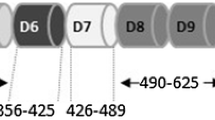Abstract.
Prolidase, a ubiquitously distributed dipeptidase, is involved in the latter stage of degradation of endogenous and dietary proteins and is particularly important in collagen catabolism. It hydrolyzes dipeptides containing proline or hydroxyproline at the C-terminal position. Mutations in the gene encoding for prolidase cause prolidase deficiency (PD), an autosomal recessive disorder mainly characterized by skin lesions, mental retardation and recurrent infectious. In this work we reported the identification of the molecular defect in five PD patients. Direct sequencing of PCR amplified genomic DNA showed a homozygous G>A transversion in two siblings leading to a G448R substitution. A heterozygous IVS11+1G>C transition causing the skipping of exon 11 and a null allele were detected in a third proband. In two unrelated patients, a homozygous IVS7-1G>A transversion was identified and shown to cause multiple alternative spliced transcripts. All the mutations result in loss of prolidase activity. Long-term cultured fibroblasts from these PD patients were used to develop an in vitro model that allowed investigation of the affected cells. Light and electron microscopy revealed that PD cells were more round and branched out than controls with increased cytosolic vacuolization, interruptions of the plasma membrane, mitochondria swelling, mitochondrial matrix and cristae modifications. JC-1 labeling showed decreased mitochondrial membrane potential. A significant intracellular accumulation of the Gly-Pro dipeptide was detected by capillary electrophoresis analysis. Our results provide the first evidence that absence of prolidase activity causes the activation of a necrosis-like cellular death, which could be responsible for the typical skin lesions in PD.
Similar content being viewed by others
Author information
Authors and Affiliations
Additional information
Electronic Publication
Rights and permissions
About this article
Cite this article
Forlino, A., Lupi, A., Vaghi, P. et al. Mutation analysis of five new patients affected by prolidase deficiency: the lack of enzyme activity causes necrosis-like cell death in cultured fibroblasts. Hum Genet 111, 314–322 (2002). https://doi.org/10.1007/s00439-002-0792-5
Received:
Accepted:
Issue Date:
DOI: https://doi.org/10.1007/s00439-002-0792-5




